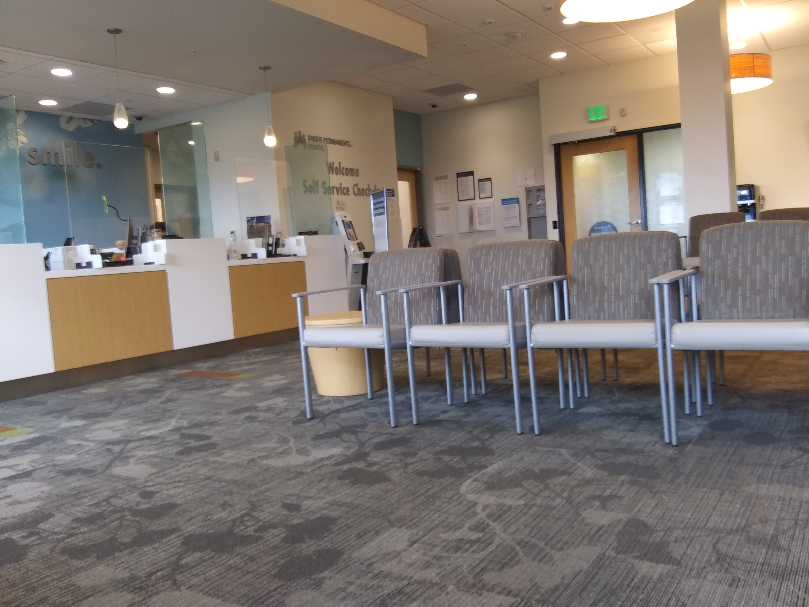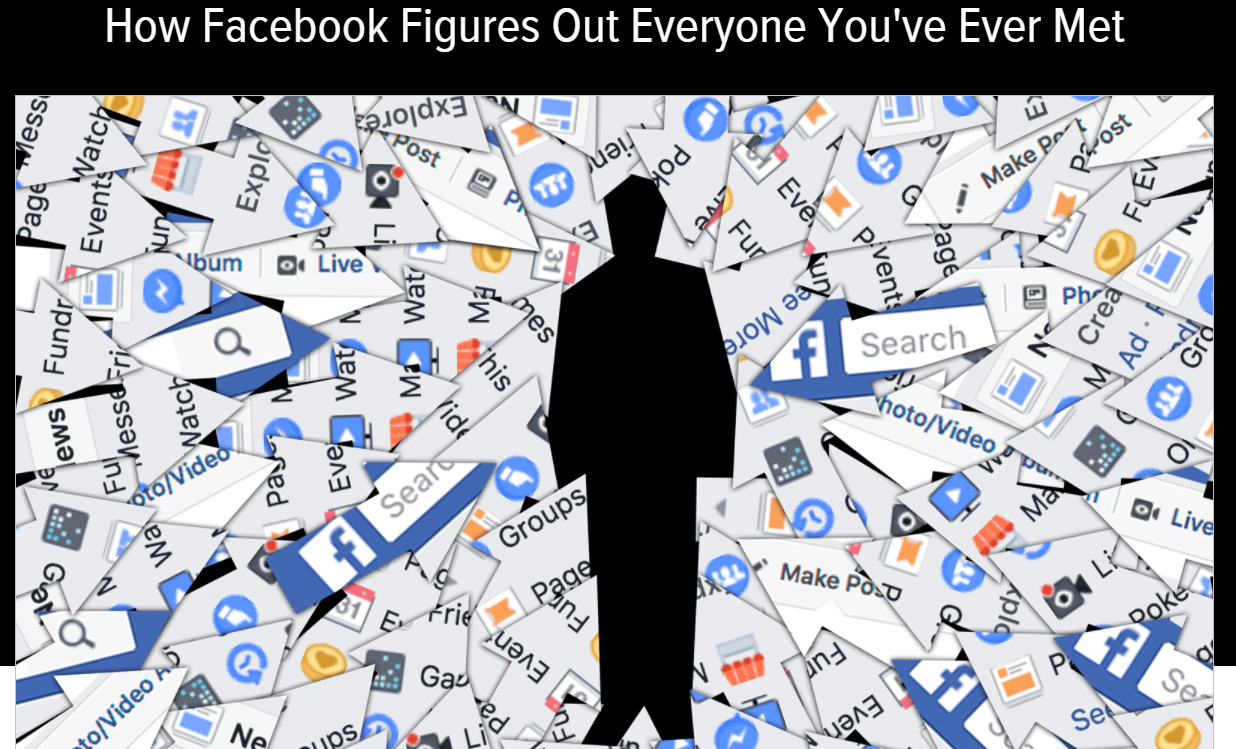 |
Zebra 3 Report by Joe Anybody
Thursday, 2 April 2020
5-5-5 The second day of 30
Mood:
 chillin'
Now Playing: wiating for the sun for some backyard fun
Topic: 5-5-5 Social Distance chillin'
Now Playing: wiating for the sun for some backyard fun
Topic: 5-5-5 Social Distance
Look forward to the upcoming 5-5-5 Social Distance Joe Anybody Zebra 3 Report So save this link here --> http://zebra3report.tripod.com/zebra3report ON THE TOP RIGHT SIDE OF THIS PAGE YOU WILL BE ABLE TO CLICK ON ANY DAY OF THE CALENDAR TO READ THAT DAYS REPORT FOR MY 5-5-5 BLOG 5 Things I did that day: 1. I had my very affordable $1.29 TV breakfast ....and coffee outside with the ducks and birds around 11 AM (slivers of sun and clouds and rain) 2. I made an outdoor tarped area to sit under and stay dry due to the never-ending rain 3. Hanged around and talked with Lee most the day - he went to work at 5:30 PM 4. In the evening I watched some old 60-70s shows like MANIX and HIGHWAY PATROL https://youtu.be/6RhJ5_PPjVM Watched it on youtube {for a few hours} - I watched some news in the morning 5. I made my bird food suet mix this evening - It now will sit in the freezer till tomorrow (pictures coming tomorrow) This is my second batch of making this. The birds love it and its easy, cheap and fun to mix up and put out and watch the feast begin. 5 Ideas & reoccuring thoughts of mine: 1. I really like that the virus situation is making us all think of life in new ways, ways that we never even considered, and I am seeing glimmers of hope that if we all work together we can solve world problems in solidarity 2. Many of the things we do and spend our time money and energy on, by great numbers here in America, are just luxury time wasting self gratification things (in my opinion) ...maybe in this social distancing reflective time, when we cant be "doing all the frills and thrills" that America constantly offers us all 24-7 around the clock non-stop ....we can maybe relaize that we sure spend lots of money and work involved for fluff n puff (material things) that really seem to be cheap and meaningless like a throw away toy. I think we put to much energy and money into mindless crap that when its not around causes the masses to go stirr crazy. 3. My job might be shut down till August - If I can use my sick pay I will be covered... if not then Oh Boy... If things go sour I might be doing a virtual unemployment application. (but) I am pretty sure that I will be able to use my 500 hours of saved up sick pay  - I hope to know more next week. Currently Im getting paid (to stay home) up till 4-15-20 - I hope to know more next week. Currently Im getting paid (to stay home) up till 4-15-20 4. All the Venezuela (Drug Dealing Blah Blah Blah) news you hear from US Corporate Media is Lies and False Information - It is horrible what the US is doing to this Latin America Country. The drug charges are lies and the fake president the USA supports in their filed coup is a crook. I heard we were sending a Navy boat to float off thier shore. GO HOME YANKEES! 5. My car tags expired on 3/31/20 - I believe I now have a 3 month grace period - Because DMV is closed and I also read that the police are not going to ticket expired tags and drivers licenses cases ...Hahaha - they never should of in the first place. Cops used to hassle you for pot, Ha - not no more... They used to hassle you for tags ...haha not no more either. In my opinion they are doing better now that they leave their money grabbing noses out of non violent people business - heck courts are closed and jails are letting low level imates out Ha!.... I LOVE IT .... They never should of beeen ramping up all this police state stuff in the first place. Save the police for dealing with real crimes and troubles seems like a smart useof our tax dollars, I like the new way they are operating (So Far Anyway) 5 Pictures of things I have seen or want to pass along to others: 1. Picture of my new tarped sitting area in the back yard 2. Another view of the hugh tarped sitting area in my backyard 3. Picture of my cheap breakfast (more of a snack) that is worth the price 4. Picture of the clean (FREE) new BBQ - Lee washed it today - it works fine 5. Zen Garden picture I saved, that I found online 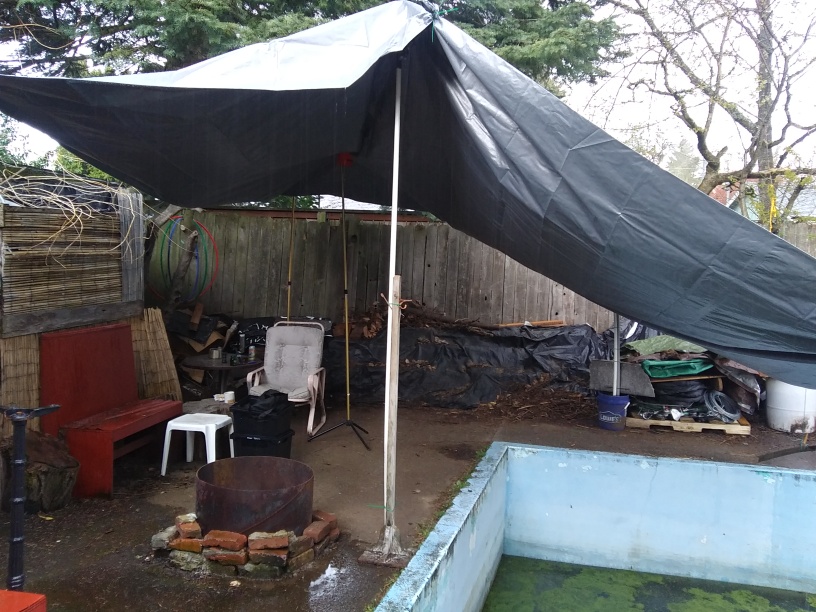 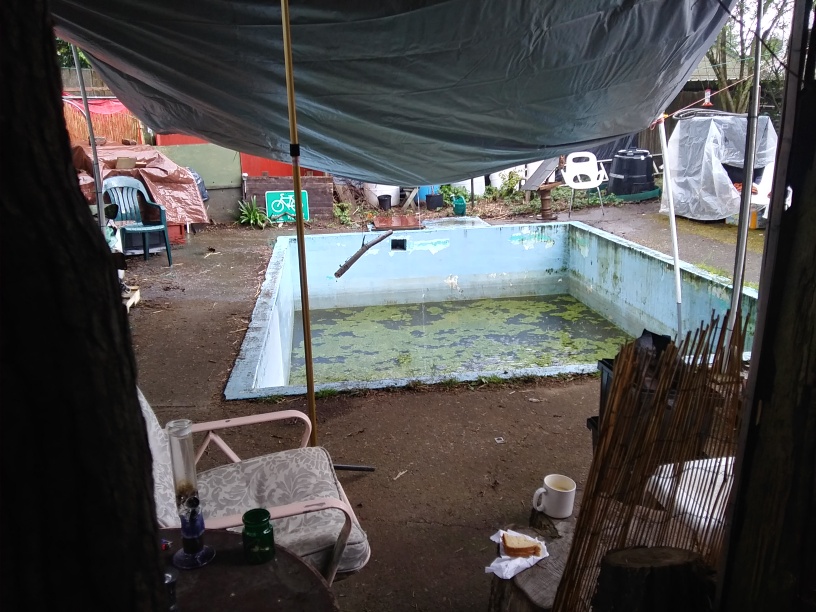
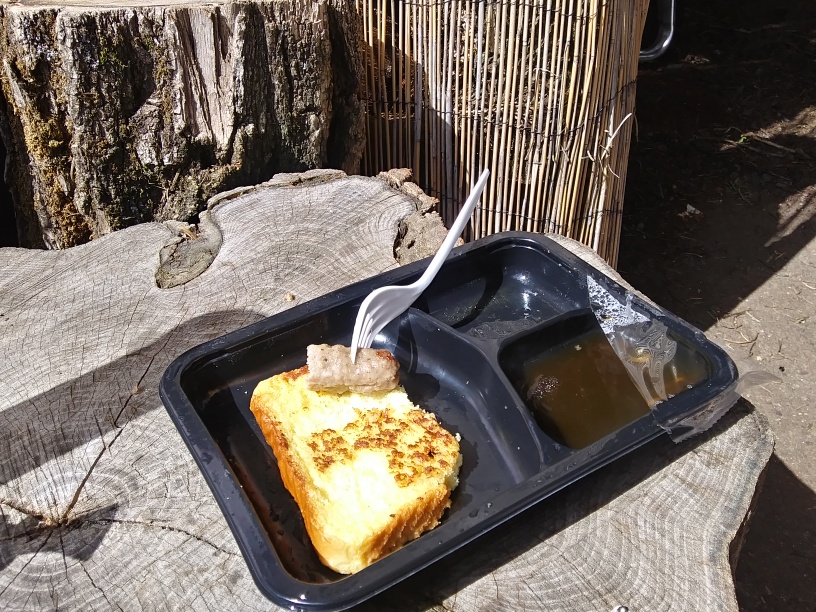
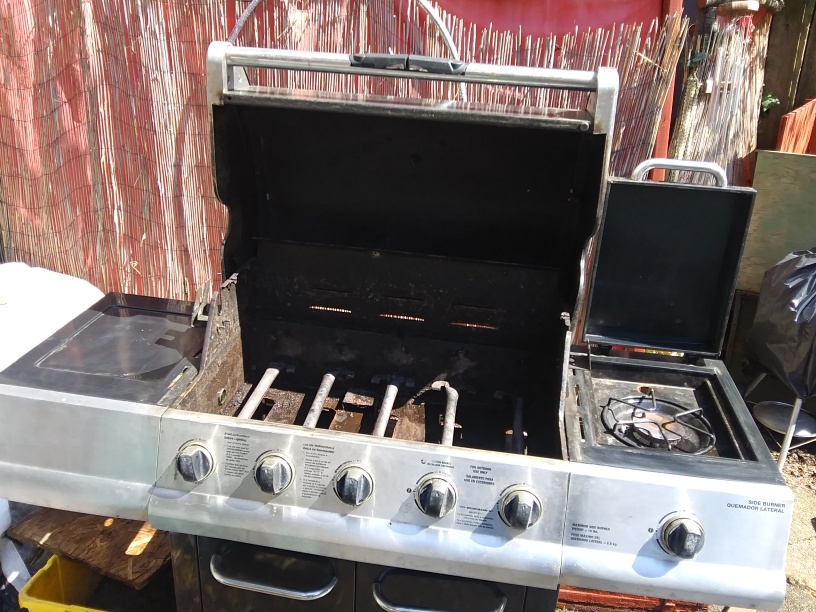
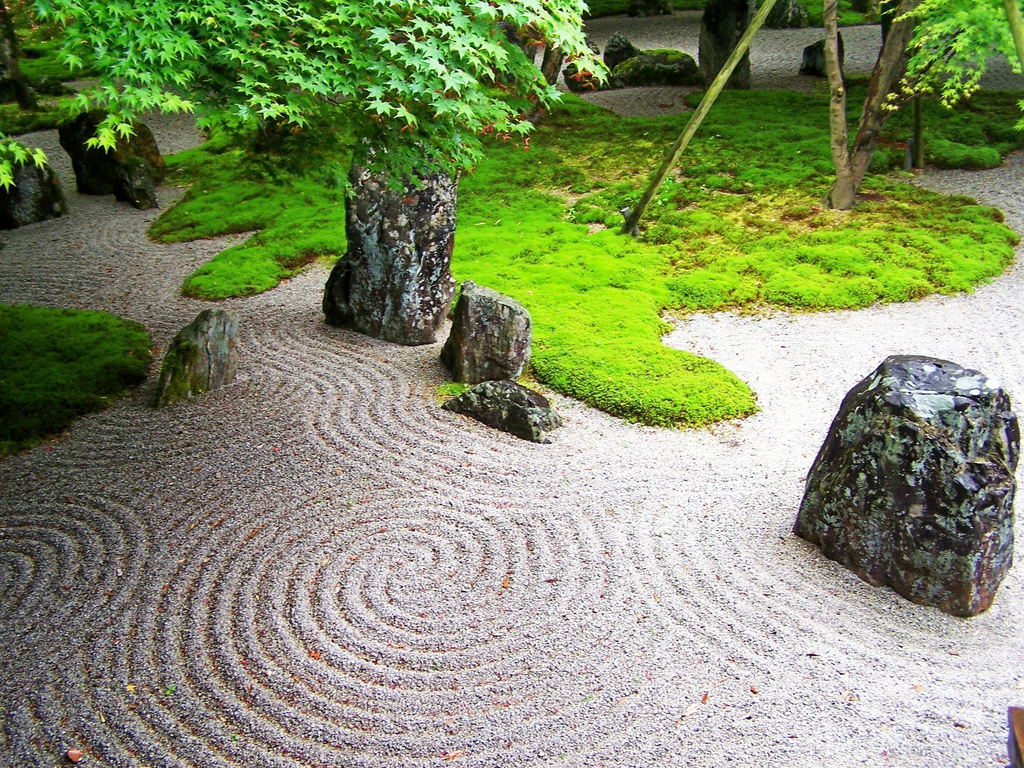
Posted by Joe Anybody
at 6:04 PM PDT
Updated: Thursday, 2 April 2020 9:18 PM PDT
Wednesday, 1 April 2020
APRIL FOOLS 5-5-5 The first day of 30
Mood:
 blue
Now Playing: COVID and Social Distancing - Ducks Arrive - Day 1
Topic: 5-5-5 Social Distance blue
Now Playing: COVID and Social Distancing - Ducks Arrive - Day 1
Topic: 5-5-5 Social Distance
Look forward to the upcoming 5-5-5 Social Distance Joe Anybody Zebra 3 Report So save this link here --> http://zebra3report.tripod.com/zebra3report ON THE TOP RIGHT SIDE OF THIS PAGE YOU WILL BE ABLE TO CLICK ON ANY DAY OF THE CALENDAR TO READ THAT DAYS REPORT FOR MY 5-5-5 BLOG 5 Things I did today: - Looked for and then took pictures throughout the day, for my new 5-5-5 blog
- Listened to podcast while working on my 5-5-5 blog
- Had 2 teeth pulled THAT WERE KILLING ME (nobody at the dentist but me} and it only took 40 mins to do it. Been up for hours at night the past 3 days.
- I bought 4 dollars worth of bird seed, varity of nuts, and oats to make some homemeade bird suet. This is my second time making these suet cakes that the birds just LOVE as well as the pesky squirls
- Watched old western videos on youtube - stayed inside sipping a beer while relaizing I am glad I have 2 teeth missing
5 Ideas & reoccuring thoughts of mine: - I wanted to share this podcast that I listened to today:
How Coronavirus Is Scrambling Our Politics. On how simple advice like avoiding handshakes plays into old ideological divides. https://megaphone.link/ATL3231449415 - I heard good news this morning 4/1/20 on the corporate media news, that the Oregon Hosipitals "are prepared" for any rise in COVID cases, so far its not rapidily growing. The fact theu are "prepared is good news"
3. The social distancing may take at least 30 more day: http://a.msn.com/01/en-us/BB121of8?ocid=scu2 4. The way people are treating others is new and encouraging, the way this virus is forcing us to work together is actually improving our love, repect and compassion for each other. There seems to be an understanding by most, that these times are rough for many folks, and it is causing us to re-evaluate and tweek our current system in how we charge people or provide needed service. I like what I am seeing in that respect. 5. I cant believe how fast n easy the dentist lady (Kaiser Sunnsyside officce) pulled my 2 teeth #wow The bad ones were located on the lower back area of my mouth. No pain in the removal process and it was fast - and no bill - I can pay it later - I picked up my perscription 10 minutes later by driving up to the Kaiser pharmacy and it was hand delivered to me inmy truck - pay later on that one to! 5 Pictures of things I have seen or want to pass along to others: 1 picture close up of one of the ducks in my backyard 2. picture of the Magnolia tree in my front yard 3. picture of "no toilet paper" still going on - 4/1/20 at WINCO in Portland Ore 4. picture of the empty waiting room at the dentist office today 5. picture of the lamp above the dental chair  
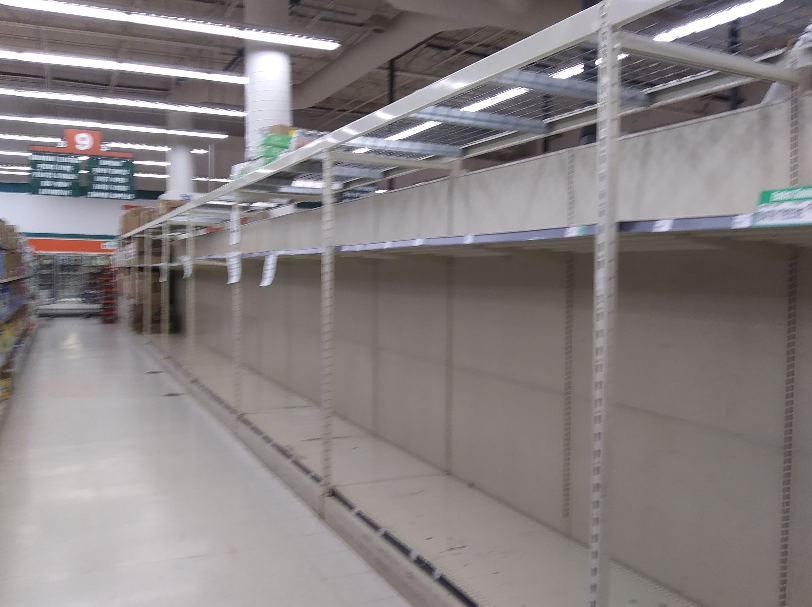
Posted by Joe Anybody
at 1:33 PM PDT
Updated: Thursday, 2 April 2020 9:17 PM PDT
Tuesday, 31 March 2020
COVID WTF - WHO WOULD OF THOUGHT
Mood:
 down
Now Playing: Stay At Home & Shut The Door and 5-5-5 Social Distance
Topic: 5-5-5 Social Distance down
Now Playing: Stay At Home & Shut The Door and 5-5-5 Social Distance
Topic: 5-5-5 Social Distance
COVID TOPIC - STAY AT HOME & WASH YOU HANDS
Its April Fools Day 2020 in the morning  This is No Joke (unfortunatly) Today 3/31/2020 I thought ... "Hey why not post some stuff I am doing or thinking of while we all are stuck at home It would be kind of .... "WHAT DID JOE DO ALL DAY" entries at the end of the day .....While I am doing nothing all day you can see that, just by looking at this Zebra 3 Report I am planing on doing a daily 5 - 5 - 5 format.... starting on 4/1/20
5 Things I did that day, 5 Ideas & reoccuring thoughts of mine, 5 Pictures of things I have seen or want to pass along to others
There will also be other sorts of muses and tidbits in this new daily Zebra 3 Report I will do this as long as I can, and I hope it has some value to somebody at sometime Just for fun ..... Here is a picture (for example) from 3 31 2020 of 2 ducks who are chilling in my backyard by the pool. Two ducks that looked just like these two, did this last year too. Not sure if they are the same ones Look forward to the upcoming 5-5-5 Social Distance Joe Anybody Zebra 3 Report So save this link here --> http://zebra3report.tripod.com/zebra3report ON THE TOP RIGHT SIDE OF THIS PAGE YOU WILL BE ABLE TO CLICK ON ANY DAY OF THE CALENDAR TO READ THAT DAYS REPORT FOR MY 5-5-5 BLOG 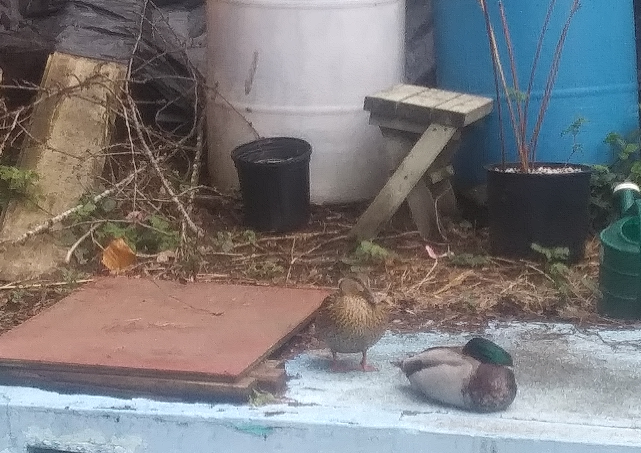
Posted by Joe Anybody
at 7:57 PM PDT
Updated: Thursday, 2 April 2020 9:15 PM PDT
Sunday, 14 April 2019
Article: Does Empathy Have A Dark Side?
Mood:
 sharp
Now Playing: Empathy seems like a good quality in human beings.
Topic: HUMANITY sharp
Now Playing: Empathy seems like a good quality in human beings.
Topic: HUMANITY
Does Empathy Have A Dark Side? April 12, 201911:43 AM ET https://www.npr.org/sections/health-shots/2019/04/12/712682406/does-empathy-have-a-dark-side?utm_source=pocket-newtab Jonathan Lambert 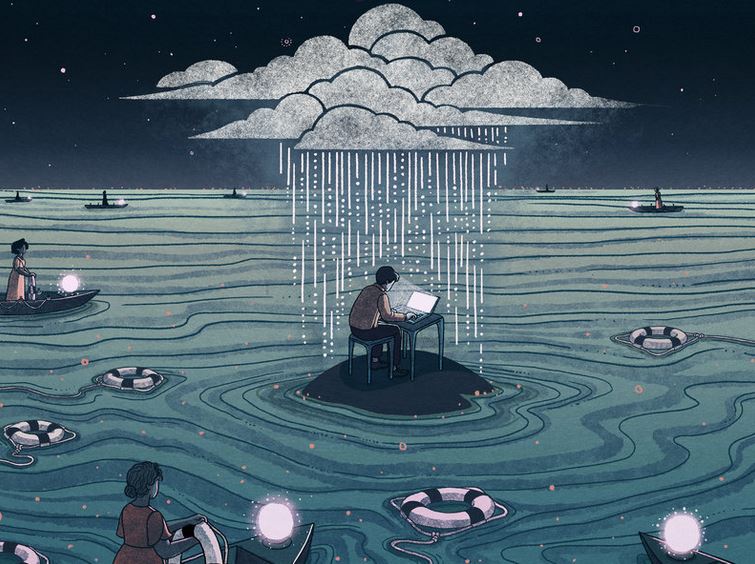
Christina Chung for NPR Empathy seems like a good quality in human beings. Pure and simple. It allows us to consider the perspective of others — to put ourselves in their shoes and imagine their experiences. From that empathetic vantage point, only good things can come, right? Not necessarily, according to author Fritz Breithaupt. "Sometimes we commit atrocities not out of a failure of empathy but rather as a direct consequence of successful, even overly successful, empathy," he writes in his forthcoming book The Dark Sides of Empathy. Listen: The End of Empathy Episode 6 of Invisibilia's Season 5 tells the same story twice in order to examine the questions: Who deserves our empathy? And is there a wrong way to empathize? Listen here. Breithaupt, who directs the Experimental Humanities Lab at Indiana University, argues that empathy is a morally ambiguous capacity, one that can lead us astray if we don't understand its many sides. "Empathy is a riddle," Breithaupt says. While it can enrich our lives, Breithaupt says our ability to identify with others' feelings can also fuel polarization, spark violence and motivate dysfunctional behavior in relationships, like helicopter parenting. Breithaupt, who reviews the cultural and scientific history of empathy in his book, explains that empathy is a relatively new concept. The term only emerged in 1909, when it was translated from a German conception of "feeling yourself into a work of art," he says. In the past 40 years, it has risen to prominence as evolutionary biologists started to explore its role in shaping the human brain. Since then, it's become a core psychological concept, and part of what biologists think makes us distinctly human. Since empathy is baked into our very being, Breithaupt argues that we must be aware of the good and bad it can enable. NPR's Jonathan Lambert spoke with him about empathy's biological and moral dimensions. The following interview has been edited for length and clarity. How does science define empathy, and what light does that shed on on more philosophical conceptions of it? For a while neuroscientists thought there was an empathy center in the brain, some little spot somewhere. They thought we could understand this spot and then understand empathy. But then they came to a much larger realization: Empathy is not in one place in our brains; it's everywhere. Imaging studies showed that we use every part of the brain both for our own actions, our own feelings, but also for the observation of other people. So basically the whole brain does empathy. That changes a lot of things. It shows us that empathy affects all our thinking. It's with us every moment. I think that means that empathy is so important to us that it's something we can't neglect. Yes, we're biologically primed for it, but we also have to cultivate it, and cultivation is something that can [be a] lifelong learning task. It never ends. 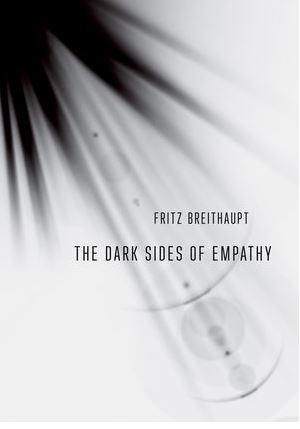
The Dark Sides of Empathy by Fritz Breithaupt Paperback, 258 pages purchase book here So science seems to suggest that empathy is sort of baked into our being. I think most people might assume that's a good thing. Why is it not necessarily? I'm not going to try to convince you to say that empathy is bad or that we should be against empathy. I think it's fundamental for us. It's absolutely something that we have to understand to know how we operate. I also think that in most cases empathy does more good than bad things. I want to put it in proportion — there are dark sides to empathy. People assume that empathy is good because it is good for the recipient of empathy — I'm actually skeptical about this. Empathy might be a little bit more selfish than many people assume. The empathizer feels less alone, they share experiences, they learn something. So we should ask for whom is [empathy] good? It's actually the empathizer in most cases. How is empathy good for the empathizer? Beings without empathy live in their own world. They can't really understand that other beings are out there with minds of their own. But beings with empathy understand that there are all these different minds around [that] have different experiences and different feelings. They can participate in them. Someone with empathy lives more than one life. Of course, sometimes that means that you have to carry the suffering of others, but in many cases their joy becomes your joy. So it's a richer, much more complex life. And in that sense, of course empathy is wonderful for you. But there's a flip side too, right? In your book you talk about something you call "vampiristic empathy." What do you mean by that? Vampiristic empathy is a form of empathy where people want to manipulate the people they empathize with so that they can, through them, experience the world in such a way that they really enjoy it. An extreme case of this is helicopter parenting. Helicopter parents are constantly trying to steer their kids in the directions they think are the right directions. Of course they want the best for their children. Very understandable; I have kids and I want what's best for them too. But I think there's something else seeping in. There's this sort of living along with the kids, imagining how it must be like to have a life that's marked by successes, where obstacles disappear and life can be enjoyed. But that also means that the parents are co-experiencing that life, so they start taking over ... they basically want to use the child almost as a pawn. In a sense, extreme helicopter parents are robbing their kids of a selfhood so that they can basically project their own self into these kids. You write that empathy can actually make us more polarized instead of bringing us together. How can that happen? People imagine that empathy can help resolve tensions in cases of conflict, but very often empathy is exactly that thing that leads to the extremes, that polarizes people even more. It can happen this way, be it a family feud or something that escalates to a civil war. Humans are very quick to take sides. And when you take one side, you take the perspective of that side. You can see the painful parts of that perspective and empathize with them, and that empathy can fuel seeing the other side as darker and darker or more dubious. One example of this comes from Northern Ireland, which has a long history of conflict. In the early 2000s school administrators there tried to resolve the conflict between the Catholic and Protestant youth by bringing empathy into the curriculum. They emphasized that students would learn both sides, and the atrocities committed by one side or the other were always put into context. Students learned this curriculum, but follow-up studies showed that this new generation was more polarized than the one before. So what this group had internalized was there's always two sides and, in the end, they know their side. So they reorganized this information to empathize with people on their side and withdraw from the other side. So Northern Ireland had to abandon this project. The other case is that of terrorists. I think a lot of terrorists may not lack empathy. Rather, they see some plight of a group they identify with — they see them suffering and see it as something horrible, and that becomes more extreme and activates them to become active terrorists. Are there other downsides to empathy? [Empathizers] may overextend themselves. If you are a medical doctor who sees a lot of suffering and pain every day, it can very quickly become too much. Something like a third of medical doctors suffer from "empathy burnout" that is so severe that it affects their functioning as doctors and their personal life. They become the victim of feeling empathy. In the end though, doesn't empathy cause more good than harm? In one sense, yes. Empathy is weakly correlated with altruistic behavior. So there is a connection. I do think empathy can help people help each other, and that makes us human. My core argument here is that in many cases of altruistic help or humanitarian aid, people actually don't really empathize as much with the person in need. They identify more with the helper, the hero, the person who intervenes even if it's an imaginary helper. It can be good when it leads to good action, but it can have downsides. For example, if you want the victims to say 'thank you.' You may even want to keep the people you help in that position of inferior victim because it can sustain your feeling of being a hero. If you want recognition and if that doesn't come, it can turn into resentment. That's an unfortunately common impulse. On the political scale, I think it happened in Germany. In 2015 Germany opened its borders, very laudably, to refugees. Initially there was a wave of huge enthusiasm, and then suddenly a huge drop in enthusiasm and a lot of resentment. What are your big takeaways about empathy? I think we can learn to use empathy in a somewhat controlled way. We can learn when to block it, when to not allow empathy to be manipulated and when to fully turn it on. Yes, we are born with empathy, but it needs constant practice [to know] when to use it and when not to use it. So the dark sides are so important to know because they teach us that in some cases you shouldn't empathize. But when it's good, we should embrace empathy, because it can lead to such richer, fuller lives. Jonathan Lambert is an intern on NPR's Science Desk. You can follow him on Twitter: @evolambert. The full article is located here: https://www.npr.org/sections/health-shots/2019/04/12/712682406/does-empathy-have-a-dark-side?utm_source=pocket-newtab
Posted by Joe Anybody
at 11:20 AM PDT
Monday, 11 December 2017
Help the Houseless - Sunnyside Community House 2017
Mood:
 bright
Now Playing: Portland Oregon: food, shelter, clothes and a sense of being known and cared about
Topic: HUMANITY bright
Now Playing: Portland Oregon: food, shelter, clothes and a sense of being known and cared about
Topic: HUMANITY
12/10/17 Portland Oregon Dear Friends and Family,
I apologize in advance for not making this note more personal. I continue
to be grateful for you in my life. I am reaching out to you today because
it's cold and rainy and my street friends are on my mind more than ever.
It's been a good year and a hard year. I've learned a lot and remain
grateful for the acts of kindness I see everywhere. Please read my attached
letter. If you can help in any way, please know I send bouquets of
gratitude your way. Feel free to pass the letter on if you know others
might be willing to help.
May this season begin and end with our caring for others less fortunate than
ourselves.
Warmly,
Pat
Sunnyside Community House
Dear Friends,
It's been a busy year at Sunnyside Community House. Our relationships with
our friends who live outside continue to grow stronger. And our
conversations are going deeper.
Their needs are basic. They need food, shelter, clothes and a sense of
being known and cared about. One of our volunteers was surprised when she
noticed one of our homeless guests reading a book that she had on her own
shelf at home. It was just one of those little reminders that we really
aren't so different from each other.
Another volunteer reported a conversation with a neighbor who , frustrated
by a camp near his house, decided to go talk with the campers and ask what
they needed. The campers didn't ask for beer, drugs, or money. They said
they needed a place to go to the bathroom, somewhere to take a shower, and
place to discard their garbage.
These homeless people see themselves as family, taking care of each other.
So dispersing them to different parts of the city isn't necessarily in their
best interest. They, like us, need their "tribe" when we are struggling.
Most of them, when I ask where they are from, tell me "Portland." For some
this city has always been their home, the place where they were born, raised
and went to school. They are our neighbors.
We have increased the number of times we make our space available for
showers. We now have as many as 150 persons /month (and a few dogs!)
taking showers. We're hoping by the end of the year to have our second
shower stall available for use. We make sure our friends get a clean pair of
socks, underwear and clothes after their shower. At least 250 pairs of
socks a month are handed out. We encourage recipients to wear two pair at a
time since many of the socks are pretty thin. Last year we had to transport
four people to the hospital because of foot problems caused from their feet
being constantly wet. We try to keep a supply of dry shoes on hand too.
It is clear that the problem of homelessness is not going away soon. We are
trying to do our part to give our friends as much as we can of what they
need to survive. Our time, and energy and money is not wasted.
But we need your help. We thank you in advance for any way you can help.
Below is a list of supplies we constantly need.
Here then is an opportunity to consider as you think about your year-end
giving:
The houseless and other low income people we serve need the following:
Sleeping bags
Blankets
Shoes
Socks
Underwear
Warm coats
Sweaters
Pants/Jeans
Backpacks
Tents
Tarps
Hats
Gloves
Laundry Soap
Band Aids
Scarves
Bus tickets
Also, we are in need of funds to help pay for our increasing water bill, to
install the second shower and to purchase an additional commercial washer
and dryer.
If you are able to donate any of these items they can be dropped off at the
Peace House, 2116 NE 18th Ave., or at Sunnyside Community House, 3520 SE
Yamhill Portland, OR 97214. Call me first (503-706-6583) to let me know you
are coming or if you have questions.
If you wish to make a tax deductible donation you can do so by writing your
check to Metanoia Peace Community UMC and in the memo line write Hard Times
Supper Ministry. It can be mailed to Metanoia Peace Community 2116 NE 18th
Ave. Portland, OR 97212.
You can also make an online donation through Metanoia Peace Community using
your credit card by going to
<file:///C:\Users\John\Documents\www.18thavepeacehouse.org>
www.18thavepeacehouse.org.
We thank you in advance for holding us in your thoughts and prayers.
Warmly,
Pat Schwiebert
Posted by Joe Anybody
at 12:44 PM PST
Monday, 27 November 2017
Face Book and its secret shadow tracking / profiling
Mood:
 don't ask
Now Playing: How does FaceBook know all my contacts
Topic: Privacy & Security don't ask
Now Playing: How does FaceBook know all my contacts
Topic: Privacy & Security
FACEBOOK KNOW ALL MY CONTACTS In real life, in the natural course of conversation, it is not uncommon to talk about a person you may know. You meet someone and say, “I’m from Sarasota,” and they say, “Oh, I have a grandparent in Sarasota,” and they tell you where they live and their name, and you may or may not recognize them. You might assume Facebook’s friend recommendations would work the same way: You tell the social network who you are, and it tells you who you might know in the online world. But Facebook’s machinery operates on a scale far beyond normal human interactions. And the results of its People You May Know algorithm are anything but obvious. In the months I’ve been writing about PYMK, as Facebook calls it, I’ve heard more than a hundred bewildering anecdotes: A man who years ago donated sperm to a couple, secretly, so they could have a child—only to have Facebook recommend the child as a person he should know. He still knows the couple but is not friends with them on Facebook. A social worker whose client called her by her nickname on their second visit, because she’d shown up in his People You May Know, despite their not having exchanged contact information. A woman whose father left her family when she was six years old—and saw his then-mistress suggested to her as a Facebook friend 40 years later. An attorney who wrote: “I deleted Facebook after it recommended as PYMK a man who was defense counsel on one of my cases. We had only communicated through my work email, which is not connected to my Facebook, which convinced me Facebook was scanning my work email.”
Connections like these seem inexplicable if you assume Facebook only knows what you’ve told it about yourself. They’re less mysterious if you know about the other file Facebook keeps on you—one that you can’t see or control. Behind the Facebook profile you’ve built for yourself is another one, a shadow profile, built from the inboxes and smartphones of other Facebook users. Contact information you’ve never given the network gets associated with your account, making it easier for Facebook to more completely map your social connections. Behind the Facebook profile you’ve built for yourself is another one, a shadow profile, built from the inboxes and smartphones of other Facebook users. Shadow contact information has been a known feature of Facebook for a few years now. But most users remain unaware of its reach and power. Because shadow-profile connections happen inside Facebook’s algorithmic black box, people can’t see how deep the data-mining of their lives truly is, until an uncanny recommendation pops up. Facebook isn’t scanning the work email of the attorney above. But it likely has her work email address on file, even if she never gave it to Facebook herself. If anyone who has the lawyer’s address in their contacts has chosen to share it with Facebook, the company can link her to anyone else who has it, such as the defense counsel in one of her cases. Facebook will not confirm how it makes specific People You May Know connections, and a Facebook spokesperson suggested that there could be other plausible explanations for most of those examples—“mutual friendships,” or people being “in the same city/network.” The spokesperson did say that of the stories on the list, the lawyer was the likeliest case for a shadow-profile connection. Handing over address books is one of the first steps Facebook asks people to take when they initially sign up, so that they can “Find Friends.” The “Find Friends” option on desktop is very basic: You enter your email address and then your email password, and Facebook will tell you everyone you know on Facebook. Meanwhile, Facebook holds on to all the contacts you handed over. The “Find Friends” page in the Facebook smartphone app is more inviting, presenting a picture of a spray of flowers and inviting the user to “See who’s on Facebook by continuously uploading your contacts.” Down in the fine print, below the “Get Started” button, the page states that “Info about your contacts...will be sent to Facebook to help you and others find friends faster.” This is vague, and the purpose remains vague even after you click on “Learn More”: When you choose to find friends on Facebook, we’ll use and securely store information about your contacts, including things like names and any nicknames; contact photo; phone numbers and other contact or related information you may have added like relation or profession; as well as data on your phone about those contacts. This helps Facebook make recommendation for you and others, and helps us provide a better service. Take a look at all the possible information associated with a contact on your phone. Then consider the accumulated data your phone is carrying about various people, whether lifelong friends or passing acquaintances. Facebook warns users to be judicious about using all this data. “You may have business or personal contacts in your phone,” the Learn More screen admonishes the reader. “Please only send friend requests to people you know personally who would welcome the invite.” Having issued this warning, and having acknowledged that people in your address book may not necessarily want to be connected to you, Facebook will then do exactly what it warned you not to do. If you agree to share your contacts, every piece of contact data you possess will go to Facebook, and the network will then use it to try to search for connections between everyone you know, no matter how slightly—and you won’t see it happen. Facebook doesn’t like, and doesn’t use, the term “shadow profiles.” It doesn’t like the term because it sounds like Facebook creates hidden profiles for people who haven’t joined the network, which Facebook says it doesn’t do. The existence of shadow contact information came to light in 2013 after Facebook admitted it had discovered and fixed “a bug.” The bug was that when a user downloaded their Facebook file, it included not just their friends’ visible contact information, but also their friends’ shadow contact information. The problem with the bug, for Facebook, was not that all the information was lumped together—it was that it had mistakenly shown users the lump existed. The extent of the connections Facebook builds around its users is supposed to be visible only to the company itself. Facebook does what it can to underplay how much data it gathers through contacts, and how widely it casts its net. “People You May Know suggestions may be based on contact information we receive from people and their friends,” Facebook spokesperson Matt Steinfeld wrote in an email. “Sometimes this means that a friend or someone you know might upload contact information—like an email address or phone number—that we associate with you. This and other signals from you help us to make sure that the people we suggest are those you likely already know and want to become friends with on Facebook.” Users of Instagram and WhatsApp, which are owned by Facebook, can also upload contacts to those apps, but Steinfeld said that Facebook does not currently use that data for Facebook friend suggestions. “Today, we use contacts uploaded to Facebook and Messenger to inform PYMK suggestions,” he wrote. Contact the Special Projects Desk Through the course of reporting this story, I discovered that many of my own friends had uploaded their contacts. While encouraging me to do the same, Facebook’s smartphone app told me that 272 of my friends have already done so. That’s a quarter of all my friends. But big as it is, that’s not even the relevant number. When Steinfeld wrote “a friend or someone you might know,” he meant anyone—any person who might at some point have labeled your phone number or email or address in their own contacts. A one-night stand from 2008, a person you got a couch from on Craiglist in 2010, a landlord from 2013: If they ever put you in their phone, or you put them in yours, Facebook could log the connection if either party were to upload their contacts. That accumulation of contact data from hundreds of people means that Facebook probably knows every address you’ve ever lived at, every email address you’ve ever used, every landline and cell phone number you’ve ever been associated with, all of your nicknames, any social network profiles associated with you, all your former instant message accounts, and anything else someone might have added about you to their phone book. As far as Facebook is concerned, none of that even counts as your own information. It belongs to the users who’ve uploaded it, and they’re the only ones with any control over it. All the people who know you and who choose to share their contacts with Facebook are making it easier for Facebook to make connections you may not want it to make. It’s what the sociologist danah boyd calls “networked privacy”: All the people who know you and who choose to share their contacts with Facebook are making it easier for Facebook to make connections you may not want it to make—say if you’re in a profession like law, medicine, social work, or even journalism, where you might not want to be connected to people you encounter at work, because of what it could reveal about them or you, or because you may not have had a friendly encounter with them. Imagine the challenge for people trying to maintain two different identities, such as sex workers or undercover investigators. Not only do you have to keep those identities apart like a security professional, you have to make sure that no one else links them either. If just one person you know has contact information for both identities and gives Facebook access to it, your worlds collide. Bruce Wayne and Clark Kent would be screwed. Shadow profile data powers Facebook’s effort to connect as many people as possible, in as many ways as possible. The company’s ability to perceive the threads connecting its billion-plus users around the globe led it to announce last year that it’s not six degrees that separate one person from another—it’s just three and a half. With its vast, hidden black book, Facebook can go beyond simply matching you directly with someone else who has your contact information. The network can do contact chaining—if two different people both have an email address or phone number for you in their contact information, that indicates that they could possibly know each other, too. It doesn’t even have to be an address or phone number that you personally told Facebook about. This is how a psychiatrist’s patients were recommended to one another and may be why a man had his secret biological daughter recommended to him. (He and she would have her parents’ contact information in common.) And it may explain why a non-Facebook user had his ex-wife recommended to his girlfriend. Facebook doesn’t keep profiles for non-users, but it does use their contact information to connect people. “Mobile phone numbers are even better than social security numbers for identifying people,” said security technologist Bruce Schneier by email. “People give them out all the time, and they’re strongly linked to identity.” “Mobile phone numbers are even better than social security numbers for identifying people.” Facebook won’t tell you how many people who aren’t your friends have handed over your contact information. The contents of your shadow profiles are not yours to see. As Violet Blue wrote in Cnet at the time of the shadow-profile bug, “What the revelation means is that Facebook has much more information on us than we know, it may not be accurate, and despite everyone’s best efforts to keep Facebook from knowing our phone numbers or work email address, the social network is getting our not-for-sharing numbers and email addresses anyway by stealing them (albeit through ‘legitimate’ means) from our friends.” What if you don’t like Facebook having this data about you? All you need to do is find every person who’s ever gotten your contact information and uploaded it to Facebook, and then ask them one by one to go to Facebook’s contact management page and delete it. Just don’t miss anyone. “Once a contact is deleted, we remove it from our system—but of course it is possible that the same contact has been uploaded by someone else,” Steinfeld wrote in an email. The shadow profiles, like the People You May Know system they feed into, can’t be turned off or opted out of. The one thing you can do to impede Facebook’s contacts-based connections is, through its Privacy Settings menu, keep people from finding your profile by searching your phone number or email address. (Yes, Facebook functions as a reverse phone-number look-up service; under the default settings, anyone can put your phone number into the search bar and pull up your account.) “Let’s say you’ve shared your phone number [or email address] with a lot of people and don’t want strangers using it to search for you on Facebook,” Steinfeld wrote. “You can limit who can look you up on Facebook by that phone number [or email address] to ‘friends.’ This is also a signal that People You May Know uses. So if a stranger uploads his address book including that phone number [or email address, it] won’t be used to suggest you to that stranger in People You May Know.” These privacy settings are an undocumented way to control to whom you get recommended in People You May Know. But you can only block People You May Know from using information you’ve actively provided to Facebook, not what’s in your shadow profile. So to protect your privacy, you need to provide Facebook with even more information about you. I asked if Facebook would consider sharing shadow profile information with its users, much like it accidentally shared it with their friends four years ago. Facebook says it can’t because it would be a privacy violation of those who gave the information. “When you choose to upload your contacts to Facebook, we consider your privacy along with the privacy of the friends, family, and others who gave you their phone number or email address,” said Facebook spokesperson Matt Steinfeld by email. “We acknowledge that people might want to see the contact information that’s been uploaded about them to Facebook, but we also have a responsibility to the people choosing to upload this information. This is a balance and we’ll continue listening to people’s feedback.” Steinfeld also said that while Facebook doesn’t currently “offer a way for people to manage the contact information others have uploaded that might be related to them, this is something I’ve shared with the team.” As usual, I asked to speak with the People You May Know team directly, but was turned down.
Posted by Joe Anybody
at 10:24 AM PST
Friday, 25 November 2016
Fasting on Thanksgiving & Not Participating in the Holiday
Mood:
 not sure
Now Playing: Solidarity with NAtive Americans & Immigrants on Thanksgiving Day
Topic: NATIVE AMERICANS not sure
Now Playing: Solidarity with NAtive Americans & Immigrants on Thanksgiving Day
Topic: NATIVE AMERICANS
Thanksgiving Day in 2016 I fasted for (3) three real reasons: The flyer below expalins my thoughts and reasoning 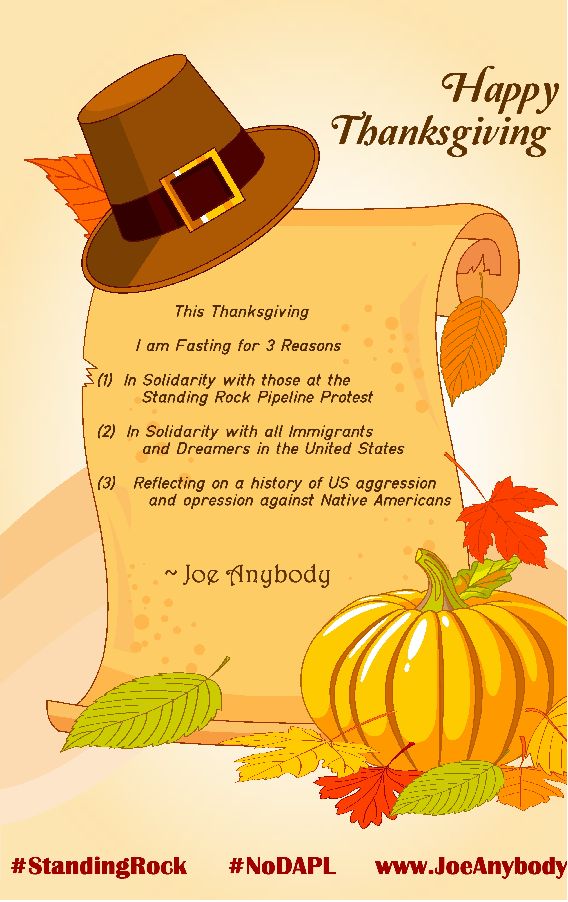 The traditional story of the first Thanksgiving feast between peaceful Pilgrims and generous Natives has been challenged by indigenous groups for decades. The United American Indians of New England began observing a “National Day of Mourning” on Thanksgiving in 1970, calling attention to the history of genocide against indigenous people that included massacres, broken treaties, and the forced assimilation of children through boarding schools that persisted into the 1970s.
Posted by Joe Anybody
at 1:19 PM PST
Updated: Friday, 25 November 2016 1:28 PM PST
Sunday, 16 October 2016
Breaking: ND Prosecutor Seeks "Riot" Charges Against Amy Goodman For Reporting On Pipeline Protest
Mood:
 on fire
Now Playing: everyone who thinks journalists who do their jobs in North Dakota should stay out of prison should sign this petition.
Topic: MEDIA on fire
Now Playing: everyone who thinks journalists who do their jobs in North Dakota should stay out of prison should sign this petition.
Topic: MEDIA
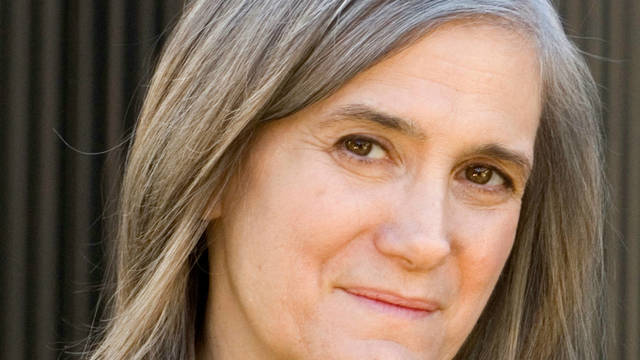 Bismarck, North Dakota–October 15, 2016 — A North Dakota state prosecutor has sought to charge award-winning journalist Amy Goodman with participating in a "riot" for filming an attack on Native American-led anti-pipeline protesters. The new charge comes after the prosecutor dropped criminal trespassing charges. http://www.democracynow.org/2016/10/15/breaking_nd_prosecutor_seeks_riot_charges State’s Attorney Ladd R Erickson filed the new charges on Friday before District Judge John Grinsteiner who will decide on Monday (October 17) whether probable cause exists for the riot charge. Goodman has travelled to North Dakota to face the charges and will appear at Morton County court on Monday at 1:30 pm local time (CDT) if the charges are approved. “I came back to North Dakota to fight a trespass charge. They saw that they could never make that charge stick, so now they want to charge me with rioting, " said Goodman. "I wasn’t trespassing, I wasn’t engaging in a riot, I was doing my job as a journalist by covering a violent attack on Native American protesters." In an e-mail to Goodman’s attorney Tom Dickson on October 12, State’s Attorney Erickson admitted that there were "legal issues with proving the notice of trespassing requirements in the statute." In an earlier email on October 12, Erickson wrote that Goodman "was not acting as a journalist," despite that fact that the state’s criminal complaint recognized that, "Amy Goodman can be seen on the video …interviewing protesters." In that email Erikson justified his quote in the Bismarck Tribune in which he had said that "She’s [Amy Goodman] a protester, basically. Everything she reported on was from the position of justifying the protest actions." The First Amendment, of course, applies irrespective of the content of a reporter’s story. The charge in State of North Dakota v. Amy Goodman, stems from Democracy Now!’s coverage of the protests against the Dakota Access pipeline. On Saturday, September 3, Democracy Now! filmed security guards working for the pipeline company attacking protesters. The report showed guards unleashing dogs and using pepper spray and featured people with bite injuries and a dog with blood dripping from its mouth and nose. Democracy Now!’s report went viral online and was viewed more than 14 million times on Facebook and was rebroadcast on many outlets, including CBS, NBC,NPR, CNN, MSNBCand the Huffington Post. On September 8th, a criminal complaint and warrant was issued for Goodman’s arrest on the trespassing charge. "Filming Native Americans being violently attacked as they defend their land is not rioting, it’s called journalism, it is protected by the First Amendment, and indeed, it is an essential function in a democratic society," said Professor Katherine Franke, chair of the board of the Center for Constitutional Rights. The pipeline project has faced months of resistance from the Standing Rock Sioux tribe and members of over 100 other tribes from across the U.S., Canada and Latin America. Goodman is the host and executive producer of Democracy Now!, a national, daily, independent, award-winning public television/radio news program that airs on over 1,400 stations worldwide. Goodman has co-authored six New York Times bestsellers and won many of journalism’s highest awards in more than three-decades working as a reporter. You can see Democracy Now!’s coverage of the pipeline and the protests here. Press information:Contact Denis Moynihan:
+1-646-217-7231
media@democracynow.org or Reed Brody +1 917 388 6745 Press Statement by Amy Goodman in front of Morton County Courthouse:
Expected Time: 1:45pm CDT, Monday Oct. 17th, 2016. Live camera positions with satellite uplink connection available onsite to interview Amy Goodman or for use by your correspondent. http://www.democracynow.org/2016/10/15/breaking_nd_prosecutor_seeks_riot_charges
Posted by Joe Anybody
at 11:28 AM PDT
Thursday, 6 October 2016
My letter to city hall regarding the Bad Police Contract - And Shutting Folks Out
Mood:
 don't ask
Now Playing: Portland police push, pepper spray protesters out of city hall
Topic: POLICE don't ask
Now Playing: Portland police push, pepper spray protesters out of city hall
Topic: POLICE
I SENT THIS LETTER TO CITY COUNCIL on 10-6 I AM OUTRAGED ON HOW THEY ARE HANDLING THIS CRITICAL SERIOUS ISSUE OF THE BAD POLICE CONTARCT and CITIZEN IMPUT (email is copied below) From: Joe Anybody [mailto:callingzebra3@hotmail.com]
Sent: Thursday, October 06, 2016 1:11 PM
To: Commissioner Fritz <amanda@portlandoregon.gov>; Commissioner Saltzman <dan@portlandoregon.gov>; Commissioner Fish <nick@portlandoregon.gov>; Commissioner Novick <novick@portlandoregon.gov>; Hales, Mayor <mayorcharliehales@portlandoregon.gov>
Cc: copwatch@portlandcopwatch.org
Subject: Dismissing public input and not listening to the public - shame on City Hall Mayor Hales and all of City Council Here is what the world is reading...regarding your games with the public citizen of Portland and the police http://portland.indymedia.org/en/2016/10/433294.shtml I am outraged to hear how you are shutting the public out of police accountability. The groups and activists and concerned citizens are being left out in the cold. All the while the mayor sends out lying notices to different neighborhoods on spinning the truth about police accountability. That is dirty and deceitful. The city is under fire from the DOJ regarding our Portland Police FORCE. (force was capitalized on purpose) And at every turn you fight to do whats right, who close down meetings, refuse to cooperate, shut doors , and arrest people as well as scaring folks to "even dare try to use their opinions" with Homeland Security and armed cops inside the chambers. You snub all the community who is concerned and care about these issues. You have outraged citizens who wont even let you speak, you pushed back so hard and neglectful many don't even want to hear you anymore (cant blame em really) You are taking the whole city down a serious rabbit hole While you "fix" the outcome and ignore good groups who really care ..like "Portland Copwatch" "AMA" "NAACP" "Consult Hardesty" Mental Health Advocates" and every other person who wants a better policing system that show up day after day on your doorsteps. The following link is posted on Portland Indymedia which is read "internationally" The whole world is watching you on the council play games as you close out the public http://portland.indymedia.org/en/2016/10/433294.shtml I sign my name "in bold print" along with the letter by Portland Copwatch that is on Indymedia I have tweeted this information out to my (1,000 plus) followers I am outraged how you treat the Portland citizens who care about these police contract issues You all should step back or down if you cant be honest and figure out how to have democracy in our city. You DON'T have a right to close the doors and conduct your 'sneaky business' all behind locked doors I really hold out hope ...that the DOJ will see through all these scandalous dirty trick the Portland City Council is using to stop any real police accountability. Further more you all should apologize to those you have insulted who are working hard in respectful ways to make "REAL" changes in how we are policed. You have insulted people of the city you work for. Shame on all you ____ (My Name) _____ PORTLAND OREGON ---------------------------------------------- ---------------------------------------------- The Way they choose to deal with this is captured in this vido footage - as they bylldozed citizens out the doors of city hall sending some to the hosipital and outers to jail. A p[rotest in front of the Mayors house is going on now. City council shoud resign https://www.youtube.com/watch?v=-2zvGuxXeFw
Posted by Joe Anybody
at 12:01 AM PDT
Tuesday, 10 November 2015
The Whole World Is Watching Austin Police Bad Tactics in 2015
Mood:
 crushed out
Now Playing: re-post - Austin Police Beat Up Men for Jaywalking in Texas
Topic: POLICE crushed out
Now Playing: re-post - Austin Police Beat Up Men for Jaywalking in Texas
Topic: POLICE
Austin Police Beat Up Men for Jaywalking in Texas (Updated)Carlos Miller 4 days agoBad Cop, No Donut, Citizen Journalism, Citizens vs. Government, Know Your Rights!, PINAC News,PINAC News Top 3, Police Abuse, Recording the Police, The Blue Line, Viral Videos 159,960 Views WATCH VIDEO --> https://www.youtube.com/watch?v=uVuyO85cINg 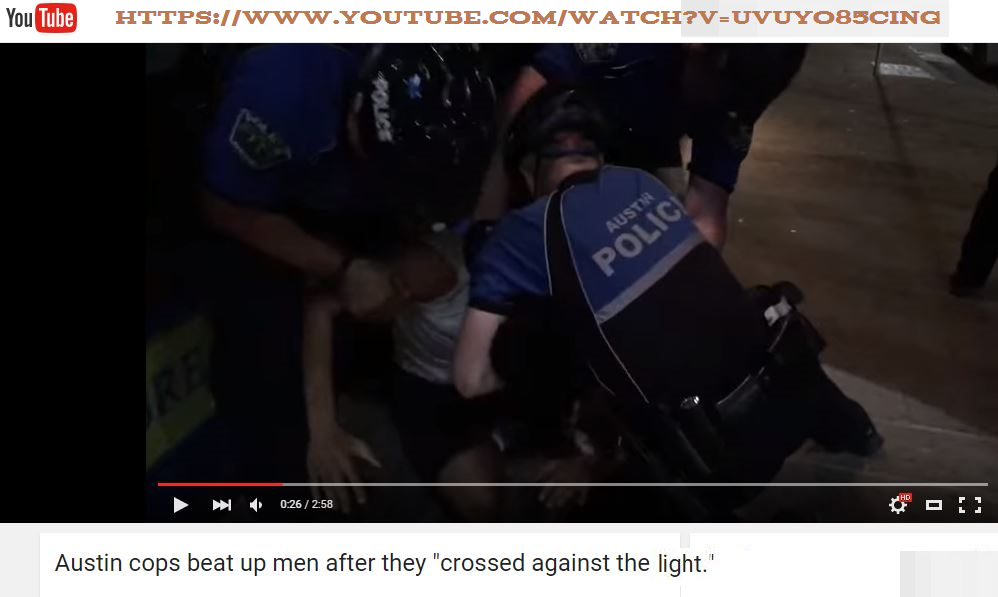 Two men had just crossed the street when they were rushed by several Austin police officers who shoved them against a wall, punching and kneeing them while telling them to stop resisting. When asked what crime had the men committed, one of the cops looked up and said, “crossed against the light.” Yes, that heinous crime of jaywalking, which is taken very serious in Austin as we learned last year when the city made international news after police beat up a jogger for jaywalking. Last Thursday police in Austin, Texas, began a “pedestrian enforcement” activity near the campus of the University of Texas, where they stopped and warned or ticketed jaywalkers. When law enforcement officers attempted to issue a jaywalking citation to a jogger, Amanda Jo Stephen, she refused to stop. Some witnesses say she didn’t hear the officers, as she was wearing earphones. Police contend that the officers were clearly visible to her. One way or the other, according to reports, police chased her down and detained her, at which point she became unco-operative and refused to give her name. Several officers then placed her under arrest, and she was carried, screaming into a police car and taken to jail, where she was booked for jaywalking and “failure to identify”.
Austin Police Chief Art Acevedo quickly came to the defense of the arresting officers, saying they may have been rough with the female college student, but at least they didn’t rape her. This person absolutely took something that was as simple as ‘Austin Police – Stop!’ and decided to do everything you see on that video,” Austin Police Chief Art Acevedo said at a press conference Friday, according to Austin NPR station 90.5 KUT. “And quite frankly she wasn’t charged with resisting. She’s lucky I wasn’t the arresting officer, because I wouldn’t have been as generous. … In other cities there’s cops who are actually committing sexual assaults on duty, so I thank God that this is what passes for a controversy in Austin, Texas,” Acevedo said.
So yes, while beating up citizens up for jaywalking might seem a bit extreme, especially since jaywalking citations are supposedly meant for safety reasons, we should be grateful that they didn’t drag the young men into a back alley and sodomize them. Instead, they dragged one of them into the street and handcuffed him. But who knows what they would have done had the cameras not been there. The video was uploaded to Facebook earlier today. But the incident took place Wednesday, according to the person who posted it. Call the Austin Police Department at 512-974-5000 or leave a comment on their Facebook page. Be sure to make screenshots of your comments in case they start deleting them, which can be used in a potential lawsuit. UPDATE: We exchanged Facebook messages with Rolando Ramiro, the young man who recorded the incident. He said he and his friends began crossing a barricaded street when the light changed as they were crossing, which made the cops demand their identifications, accusing them of jaywalking. “Fuck no,” one of his friend’s said, pointing out that it was a barricaded street with no traffic, essentially a legal pedestrian walkway. Apparently, the cop wanted them to stop for a yellow crossing light as they were stepping into the street, even though the street was barricaded forbidding any cars from entering. And it doesn’t matter anyway. What matters is that the Austin Police Department acted like complete thugs. The punching. The kicking. The arrogance.
Ramiro did an excellent job recording the insanity. Note how he recorded holding the phone horizontally. Note the difference from the usual vertical videos. Make it instinct to record horizontally. Not enough people do. THIS ARTICLE IS RE-POSTED FROM THIS WEBSITE
Posted by Joe Anybody
at 1:33 PM PST
Newer | Latest | Older
|
| « |
April 2020 |
» |
 |
| S |
M |
T |
W |
T |
F |
S |
|
|
|
1 |
2 |
3 |
4 |
| 5 |
6 |
7 |
8 |
9 |
10 |
11 |
| 12 |
13 |
14 |
15 |
16 |
17 |
18 |
| 19 |
20 |
21 |
22 |
23 |
24 |
25 |
| 26 |
27 |
28 |
29 |
30 |
|
 - I hope to know more next week. Currently Im getting paid (to stay home) up till 4-15-20
- I hope to know more next week. Currently Im getting paid (to stay home) up till 4-15-20










